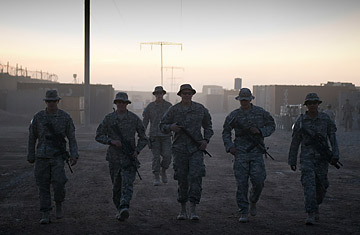
Troops with the 502nd Infantry, 2nd Batallion walk in the camp of Howz-e-Madad district, near Kandahar city, Afghanistan, on Nov. 23, 2010
You know it's a messy war when you can't recognize the enemy — even when he's sitting across the negotiating table from you.
Earlier this year, an Afghan showed up in Kabul claiming to speak for the leader of the Taliban, the one-eyed Mullah Omar. He called himself Mullah Akhtar Muhammad Mansour and presented himself as the same Mullah Mansour who is known to be close to the Taliban's "commander of the faithful." The man said he'd been sent by Omar to negotiate over peace terms with the government of Afghanistan. At some point, NATO got in on the conversation and agreed to support and facilitate the process. So far, so good. After all, it's basically inevitable that we'll someday end up in some sort of negotiation with the Taliban. But the systems alarms had plenty of reason to have been blinking red that the man was a fraud.
For one thing, Mansour accepted money, apparently bags of it. Why wasn't Kabul and NATO immediately suspicious? The Taliban is driven by faith and nationalist fervor, not money. And even if an emissary from the Taliban were a greedy individual, would he really have risked betrayal and certain execution at the hands of Omar?
Secondly, what sort of bona fides did Mansour show up with in Kabul? Secret negotiations like these always start with something concrete, like a prisoner exchange or a cease-fire to prove the capacity of those around the table to deliver on their undertakings. The emissaries on both sides always possess information that is not public. Alternatively, such negotiations can be brokered by a bona fide third party, like Pakistan's Inter-Services Intelligence (ISI). None of these basic steps appears to have been followed in this case.
Finally, what should have given away the counterfeit Mansour was the man's claim that the Taliban was determined to see a peaceful settlement to the war, and even allow NATO forces to remain in Afghanistan during a transition period. A concession like this is completely contrary to everything the Taliban has been saying since it was unseated in 2001.
The swindle came apart only after an Afghan on the government side who knew the real Mansour told his superiors that their interlocutor was not the man he claimed to be. The counterfeit Mansour has since disappeared, and it's unlikely we'll ever learn the whole story. But the simplest explanation seems the best: He was in it for the money. The chances are good that we can exclude the possibility that the counterfeit Mansour was a provocateur run into us by either the ISI or the Taliban. They would have been a lot more subtler, and would never have let their patsy take money.
We have been in Afghanistan for nine years now, and you'd think we would have a better sense of the country — I don't know, at least have a PowerPoint with pictures and names of the Taliban's leadership. What's happened to the billions of dollars we've spent on biometrics, the kind that can read an iris at 35 feet or whatever? Why didn't NATO have a picture of the real Mansour? Sounds like another worrying sign that we're fighting blind in Afghanistan.
Baer, a former Middle East CIA field officer, is TIME.com's intelligence columnist and the author of See No Evil and, most recently, The Devil We Know: Dealing with the New Iranian Superpower.
